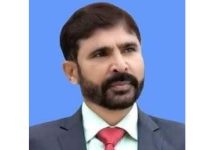Imtiaz Gul
Dec 07, (DNA):The judiciary played a facilitating role in establishing the authoritarian rule. Sections of the media contributed to the consolidation of such governance.
At first sight these two sentences read like a glimpse from Pakistan’s current political situation. But these were in fact words from Dr Iftekharuzzaman, the Executive Director of Transparency International Bangladesh (TIB), during his address to the participants of a training workshop on investigative journalism on legal affairs at the Midas Centre in Dhaka.
“The independence of the judiciary and the media are intrinsically linked,” Iftekharuzzaman said while emphasising the need for political reforms to achieve a functional judiciary.
Such calls are part of the political jargon in the post August 5 Bangladesh, when Shaikh Hasina was made to flee the country after weeks of tyranny she piled on student demonstrators. Anti-state, cyber criminals, enemies of the state, hooligans, traitors inter alia were some of the names Hasina and her coterie of loyalists gave to students against discrimination. They had considered the students’ movement as an easy push away, which would melt under brute state power. It was a self-serving delusional approach, disregarding the factor of incumbency. Absolute power rested with Prime Minister Hasina, who seemed blinded by the new, ever-evolving realities. This intoxication with power and contempt for the razakars – a metaphor the Awami League used to equate the students with the Jamaat-e-Islami volunteers who had resisted the creation of Bangladesh in 1971. Simultaneously they deployed brute state power to quell the uprising. But this maliciously self-serving rhetoric eventually led to their downfall. The ferocity of the protests disproved them.
Sounds like the self-righteous verbose pronouncements in Pakistan? In Bangladesh, the mighty Awami League stakeholders had ceded entire authority to Shaikh Hasina. Here, our political and legal luminaries have surrendered civil rights to “empower” state agencies to handle individuals as they deem fit. It is a self-serving conduct directed at a foe that the rulers feel is not manageable politically. A shameful approach because starting with the post-Ziaul Haq era from 1988 onwards, both the PPP and the Sharif Muslim League have been at loggerheads, deploying all possible means to run down the other. But they never stooped low enough to surrender democratic rights the way they have done since April 2022. The only apparent driver for this journey down the lane of shame is their inability to beat their common enemy, the PTI, in the field.
One obvious intent behind the litany of amendments since April 2022 – the Army Act; Practice and Procedures Act; creation of the constitutional bench at the Supreme Court; and proposed changes to the Anti-Terrorism Act, 1997 – is to tame the PTI by letting the powers-that-be to deal with the political challenges the party poses to all opponents. Doesn’t that amount to shackling the adversary into submission, or delivering a handcuffed David to an armed-to-teeth Goliath?
Does this exorcise the hearts and minds of the spirit they are wedded to? Force has never done so. It only erodes authority – regardless of how fanciful narratives may come from the top.
The word barrister denotes a person who stands in defence of law and protection of rights. Isn’t an insult to the education these barristers get in London and a slur on their conscience to use a controversially composed parliament for empowering the military to marginalise PTI just because the two dynasties and the establishment have lost their narrative to a new generation of Pakistanis? How will barristers Azam Nazir Tarar, Daniyal Chaudhry and Mohsin Shahnawaz Ranjha explain the rationale of their “legislative achievements” to their Harvard, Oxford educated scions?
People at large evidently despise the status quo just because they failed, repeatedly, to take the nation out of the colonial-era governance mindset into a state that is based on people-centric governance and focused on the citizens’ welfare than on the enrichment of a few.
The policy to provide blanket pardon to those who fall in line and a vicious persecution on the slightest pretext of those who refuse to comply with the diktat of the rulers is only further deepening the cleft between the people and the state institutions. No nationalistic rhetoric or intimidation in the guise of national security can restore the trust broken by brazen willful high-handedness.
The ability to counter the “entire threat spectrum” is not confined to the defence of the geography alone. While our forces continue to defend the frontiers, shielding other elements of the spectrum i.e. financial sovereignty, trust of citizens in state institutions (that is necessary as a first line of defence), internal economic prowess and political stability are much more important than the geographical frontiers. Without attending to the latter elements, states remain fragile and exposed to all kinds of threats, and hence absolutely unavoidable in a changing complex world.

















